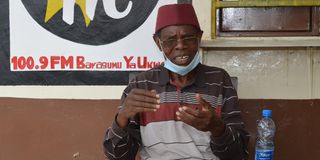Premium
On case terminations, we are back to Nyayo era, when Amos Wako reigned

Former Attorney General and ex-Busia Senator Amos Wako. Wako will lead Azimio la Umoja One Kenya Coalition's team in the panel for audit of 2022 polls.
Sometime in 1995, then Lang’ata MP Raila Odinga filed a private prosecution against Cabinet minister George Saitoti over the multibillion-shilling Goldenberg scandal.
Raila hoped the truth about a gold export compensation scheme that Treasury officials and other fat-cats used to bilk the coffers would finally be exposed.
But shortly after Raila filed the case, it was taken over by Attorney-General Amos Wako, ostensibly in the public interest, and terminated. But, unfortunately, for Mr Odinga, Mr Wako was within the law.
Mr Odinga was left clutching the court papers and perhaps a bill from his lawyers.
Mr Wako told us that the Goldenberg case was politically instigated. Kanu members cheered for yet another victory against the Opposition. History repeats itself.
I am revisiting this matter since there is some renewed focus on the Office of the Director of Public Prosecutions, which is now under Noordin Haji and which has gone on a spree terminating cases it had taken to court.
In other jurisdictions and working democracies, Mr Haji should have resigned. But he is being cheered on – just like we did with Mr Wako.
Back to the Goldenberg, which was Kamlesh Pattni's baby with State House mandarins, the Law Society of Kenya had filed a similar case through lawyer Paul Muite and hoped Kenyans would know the truth.
But LSK faced the same fate after Mr Wako took over the case and terminated it.
Indeed, the nolle prosequi — a Latin term that means 'do not prosecute' — was being abused. Kenyans were enraged. There was bitterness.
Taxpayers had lost money, and nobody was willing to prosecute. That money would have built a hospital. A school. Fed the hungry. It was your money.
No one jailed
Today, nobody is in jail over Goldenberg. And yet, $600 million (about Sh75 billion at current rates) disappeared in fictitious gold export transactions — and is still in people's bank accounts.
The sacred cows of the Nyayo era were raised and fattened in that period. Back then, all that was required was for the Attorney-General to stand in court and withdraw a case.
These frustrations informed the setting-up of an independent Office of the Director of Public Prosecutions — only answerable to itself and which would not be dictated to by the Executive or some politicos.
History shows us that nolle prosequi was also used by the state to end cases on which it had no evidence even after it had taken victims through torture and harassment.
Former Subukia (and Nakuru North) MP Koigi Wamwere had gone through this, and his predicament is contained in his books. For instance, there was the time he was arrested — he says in Uganda — and charged with treason in October 1990. After years of court mentions and drama — the case was dropped in January 1993 before any hearing started.

Former Subukia (and Nakuru North) MP Koigi Wamwere. There was the time he was arrested — he says in Uganda — and charged with treason in October 1990. After years of court mentions and drama — the case was dropped in January 1993 before any hearing started.
Koigi had been in custody for two years, which was enough punishment.
In all these cases, the state was not even under any pressure to give a reason for terminating a case.
It was only in 1998 when young Nairobi lawyer Kibe Mungai challenged the Attorney General's powers to issue a nolle prosequi and thus stop any criminal case – notwithstanding the amount of time taken in the case.
This challenge came up in the case of Chrispus Karanja Njogu versus the Attorney-General, and it was to test whether the AG held the last word in criminal matters — and at what point the AG should withdraw a case.
Let me recount this case for us to understand lawyer Kibe Mungai’s argument. It all started in 1998 when Njogu, then an assistant registrar at Kenyatta University, was accused of making fake degree certificates.
At the time of his arrest, Mr Njogu was the Acting Senior Assistant Registrar in the Examinations Section. His arrest followed reports that fake Kenyatta University degree certificates were in circulation (or on sale).
While the university had initially dismissed the media reports, it invited police to investigate the matter.
As a result, on Tuesday, March 24, 1998, Mr Njogu was arrested and charged before Nairobi Senior Resident Magistrate Christine Meoli, for making counterfeit degree certificates. Inspector Phillip Musyimi led the prosecution.
Cover-up
When the case came up for hearing, the court was told by witnesses that Zippy Printers, where police allegedly found the certificates, was legally contracted by Kenyatta University to print the degree certificates. There was also some cover-up, and Mr Njogu was sacrificed. The university then tried to withdraw the case, and the state entered a nolle prosequi. By then, the state had called all its witnesses.
What happened is that Mr Njogu’s lawyer objected and referred the matter to the High Court for interpretation on whether the Attorney-General's powers to enter a nolle prosequi were unlimited. As a result, a constitutional court comprising three Judges: Justice Kalpana Rawal, Justice Samuel Oguk and Justice Alex Etyang, heard the case.
This constitutional case was crucial, for it tested the state's power to withdraw cases and the limits to which that could be done. It was the first time in 26 years that the High Court was again being asked to rule on the powers of the AG to end cases at will.
There was a previous case — Alfred Njau and others vs City Council of Nairobi — where the High Court had ruled that the AG had the discretion to enter a nolle prosequi in which a 1977 English case was cited as a precedent.

Director of Public Prosecutions, Noordin Haji. The ODPP has gone on a spree terminating cases it had taken to court. In other jurisdictions and working democracies, Mr Haji should have resigned.
Those who have read the Alfred Njau case will find that the court held that: "The AG has many powers and duties. He may stop any prosecution on indictment by entering a nolle prosequi. He merely has to sign a piece of paper saying that he does not wish the prosecution to continue. He need not give any reasons."
The court concluded: "In the exercise of these powers, he is not subject to direction by his ministerial colleagues or to the control and supervision of the courts."
And that is why the Kenyatta University case was a unique one. If it had succeeded, it would have reviewed some powers that the State Law Office abused. One of the questions that the case raised was whether Mr Njogu — who later sued the university and was awarded Sh1.2 million by Justice Hatari Waweru — was entitled to question the discretion of the AG to enter a nolle prosequi and to get a reason.
The question being asked was: Were the powers to prosecute, or not to prosecute, given to the AG open to abuse? Would this withdrawal amount to an abuse of the court process? Would it be detrimental to public policy? The other question was whether courts should police the AG while carrying out that duty.
In their ruling, the three judges held that the powers of nolle prosequi were subject to "oversight" by the High Court. Thus, this particular device that the Constitution had given to the AG had some limitations. But still, there were clauses in the Constitution that gave the AG immense powers to take over criminal cases, terminate them, reinstitute them — and so on. They had not been declared unconstitutional.
This judicial finding was tested in 2004 — in the case Gregory and another versus Republic - when three High Court judges, Jessie Lesiit, Mohammed Ibrahim and Jackton Ojwang, again took the view that the AG's prosecutorial powers are "subject to oversight by the High Court".
Further, the judges said that the exercise of the power of the AG to terminate criminal proceedings by entering a nolle prosequi is quasi-judicial. In 2005, in the Adan Keynan Wehliye v Republic, three High Court judges — Joseph Nyamu, Mary Kasango, and Milton Makhandia — stated that the AG should use the power of nolle prosequi to advance the cause of criminal justice and not obstruct it.
And that brings me back to what we witnessed at the Office of the Director of Public Prosecutions. The 2010 Constitution was formulated to cure some of these problems within the old Constitution.
But, unfortunately, some bad habits are creeping back – and in torrents.
It is easy to argue that all the multimillion-shilling cases that have been withdrawn were politically motivated.
It was the same argument Mr Wako gave us when he withdrew the Goldenberg cases.
The rest is history.
[email protected] @johnkamau1





